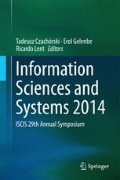Abstract
Dynamic Fault Trees (DFT) are a generalization of Fault Trees which allow the evaluation of the reliability of complex and redundant systems. We propose to analyze DFT by a new version of time-parallel simulation method we have recently introduced. This method takes into account the monotonicity of the sample-paths to derive upper and lower bounds of the paths which become tighter when we increase the simulation time. As some gates of the DFT are not monotone, we adapt our method.
Access this chapter
Tax calculation will be finalised at checkout
Purchases are for personal use only
References
H. Boudali, P. Crouzen, M. Stoelinga, Dynamic fault tree analysis using input/output interactive markov chains, in The 37th Annual IEEE/IFIP International Conference on Dependable Systems and Networks, DSN 2007, Edinburgh, UK, pp. 708–717 (2007)
P. Brémaud, Markov Chains: Gibbs fields, Monte Carlo Simulation and Queues (Springer-Verlag, New York, 1999)
J.-M. Fourneau, I. Kadi, N. Pekergin, Improving time parallel simulation for monotone systems, in 13th IEEE/ACM International Symposium on Distributed Simulation and Real Time Applications, ed. by S.J. Turner, D. Roberts, W. Cai, A. El-Saddik, Singapore, pp. 231–234 (2009)
J.-M. Fourneau, F. Quessette, Tradeoff between accuracy and efficiency in the time-parallel simulation of monotone systems, in EPEW 2012, Munich (2012)
G. Merle, J.-M. Roussel, J.-J. Lesage, Algebraic determination of the structure function of dynamic fault trees. Reliab. Eng. Syst. Saf. 96(2), 267–277 (2011)
NASA. Fault tree handbook, nureg-0492, technical report, United States Nuclear Regulatory Commission (1981)
D. Nicol, A. Greenberg, B. Lubachevsky, Massively parallel algorithms for trace-driven cache simulations. IEEE Trans. Parallel Distrib. Syst. 5(8), 849–859 (1994)
K.D. Rao, V. Gopika, V.V.S.S. Rao, H.S. Kushwaha, A.K. Verma, A. Srividya, Dynamic fault tree analysis using monte carlo simulation in probabilistic safety assessment. Reliab. Eng. Syst. Saf. 94(4), 872–883 (2009)
T. Yuge, S. Yanagi, Quantitative analysis of a fault tree with priority and gates. Reliab. Eng. Syst. Saf. 93(11), 1577–1583 (2008)
Acknowledgments
This work was partially supported by grant ANR MARMOTE (ANR-12-MONU-0019).
Author information
Authors and Affiliations
Corresponding author
Editor information
Editors and Affiliations
Rights and permissions
Copyright information
© 2014 Springer International Publishing Switzerland
About this paper
Cite this paper
Dao Thi, T.H., Fourneau, J.M., Pekergin, N., Quessette, F. (2014). Time Parallel Simulation for Dynamic Fault Trees. In: Czachórski, T., Gelenbe, E., Lent, R. (eds) Information Sciences and Systems 2014. Springer, Cham. https://doi.org/10.1007/978-3-319-09465-6_35
Download citation
DOI: https://doi.org/10.1007/978-3-319-09465-6_35
Published:
Publisher Name: Springer, Cham
Print ISBN: 978-3-319-09464-9
Online ISBN: 978-3-319-09465-6
eBook Packages: Computer ScienceComputer Science (R0)

